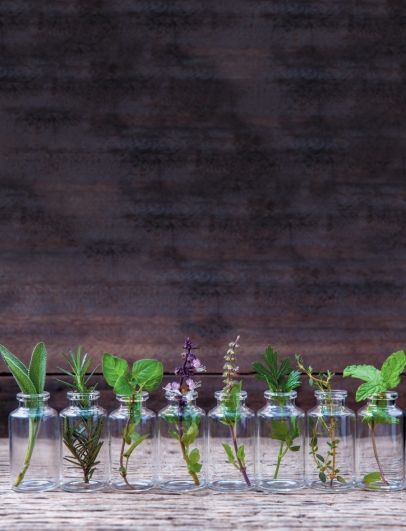Herbal Remedies
Looking for a more natural path to better health or to soothe what ails you?
Then look no further than the University of Florida Institute of Food and Agricultural Sciences (IFAS) Sarasota Extension Office.
The extension office will offer several three-hour hands-on workshops on topics like “Soothing Salves and Luscious Lotions,” “Lozenges and Lollipops,” and “Making Herbal Teas.” These workshops follow up on lectures that Clements offered about making herbal remedies at home. The lectures and workshops are part of the extension office’s Medicine from Nature series.
Herbal remedies have a long history in the U.S. and around the world. In fact, herbal remedies once were used more than pharmaceuticals for better health, Clements says. In some countries, herbal remedies have thousands of years of history. Many drugs have herbal components in them as well.
There’s an overall frustration nowadays with medical care and the cost of medications, and that spurs an interest in more natural treatment options, Clements believes. “People want to go back to basics and be more connected to their bodies,” she says.
Many Americans already use natural or alternative medicine approaches. A 2011 survey from AARP and the National Center for Complementary and Alternative Medicine found that more than 50% of Americans over the age of 50 have used complementary and alternative medicine, or CAM; CAM is an umbrella term for things like acupuncture, meditation, and dietary supplements. In that age group, herbal products or dietary supplements were the type of CAM most commonly used.
Clements shares two examples of herbs that can improve health. One is chamomile, which you’ve probably tried before in a tea. Chamomile can help us feel more calm, relaxed, and able to sleep easier, Clements says. Another example is Florida’s native passion flower, a beautiful purple flower that is shown to help with anxiousness, worry, and concentration issue Even items we might consume regularly, like ginger and cinnamon, are herbal remedies that can have health benefits, she adds.
In the workshops, the safety and side effects of herbals will be discussed. “Just because they are natural does not mean they are without side effects,” says Clements, who worked as a practicing naturopathic physician for 14 years.
Clements will cover where to find herbs, such as at health food stores and online. She encourages those interested in herbal remedies to check where the herbs come from, to make sure they are of high quality. Some herbs even can be grown in your background, she adds.
Sessions are $25 each. For more information, call 941-861-5000 or email sarasota@ifas.ufl.edu. Registration is available through Eventbrite.com.




